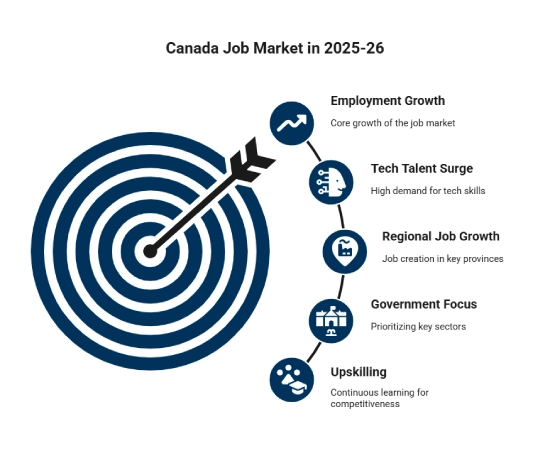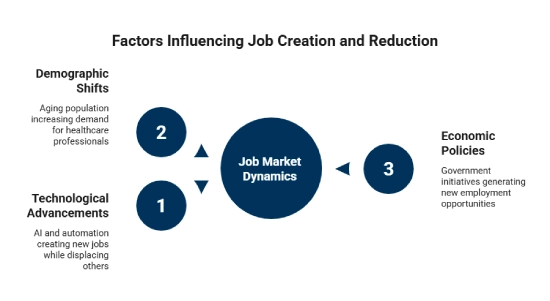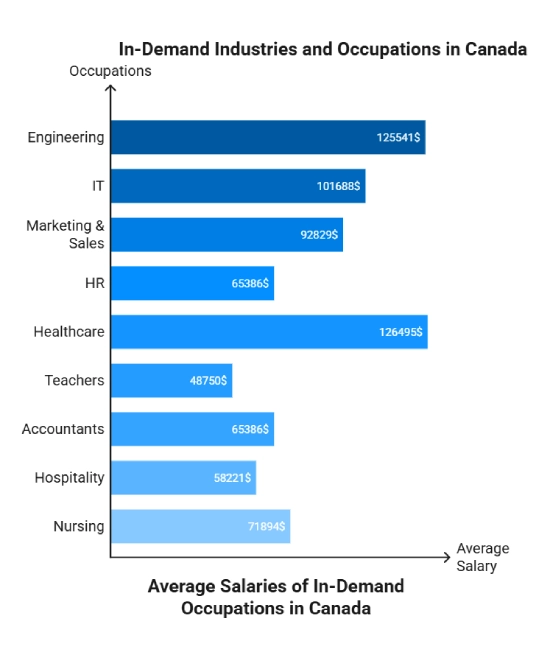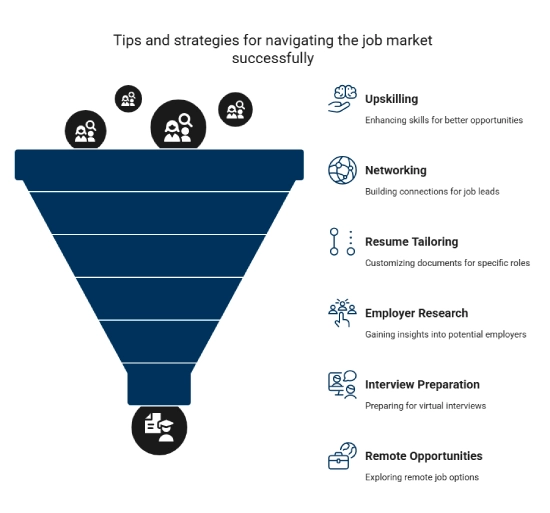Canada Job Market in 2025-26
The Canadian job market is expected to continue evolving in 2025-26. There should be a substantial requirement for skilled workers, mostly in tech, healthcare, and engineering. The country's job numbers should keep going up, with more chances in different fields. What the government does and new tech will also impact jobs in the years ahead, changing what the workforce looks like.
Key Highlights for Canada Job Market in 2025-26:
- 2% Employment Growth: Canada's job market is expected to grow by 2% in 2025-26, creating ample opportunities across various sectors.
- Tech Talent Surge: High demand for skilled professionals in AI, data analytics, and cybersecurity.
- Regional Job Growth: Ontario, British Columbia, and Alberta will lead job creation, especially in healthcare and tech.
- Government Focus: Prioritizing job creation in healthcare, clean energy, and tech sectors.
- Upskilling is Key: Continuous learning will be crucial for job seekers to stay competitive in an evolving job market.

Job Outlook in Canada 2025-26
The job outlook for Canada in 2025-26 remains positive, with a steady increase in job opportunities driven by economic growth, technological advancements, and an aging population. Unemployment rates are expected to stabilize, and more skilled professionals will be needed to meet the demands of growing industries like tech, healthcare, and clean energy. The Canadian government’s policies, along with sector-specific demand, will shape the future of the job market.
General Employment Trends for the Year
In 2025, several factors will shape Canada's job market. This includes new tech, changing population sizes, and a greater focus on jobs that support environmental stability. Expect to see more jobs in high-skill areas like IT, healthcare, and green energy. Because more companies are moving to digital approaches, there will be a greater need for tech experts. Also, because the population is getting older, we’ll require more healthcare staff and caregivers.
Factors Influencing Job Creation or Reduction
Several factors will influence job creation or reduction in Canada by 2025:
- Technological Advancements: The continued development of AI, automation, and cloud computing will create job opportunities while displacing some traditional roles.
- Demographic Shifts: The aging population will increase demand for healthcare and eldercare professionals.
- Economic Policies: Government initiatives, such as incentives for clean energy projects and infrastructure development, will generate new employment opportunities.

In-Demand Industries and Occupations in Canada
The best fields in Canada for job growth should be tech, healthcare, engineering, and clean energy. The economy is changing fast, so there will be jobs that are brand new, and some jobs will change to keep up with tech and society.
|
Occupations |
Salary |
|
Engineering |
$125,541 |
|
IT |
$101,688 |
|
Marketing & Sales |
$92,829 |
|
HR |
$65,386 |
|
Healthcare |
$126,495 |
|
Teachers |
$48,750 |
|
Accountants |
$65,386 |
|
Hospitality |
$58,221 |
|
Nursing |
$71,894 |

Workforce Demands in Different Canadian Provinces and Territories
Below are the details of the workforce demand and opportunities in different Canadian territories and provinces:
Examination of job market differences across provinces and territories
- Canada is a desirable destination for individuals seeking new prospects, as it boasts a strong job market and appealing advantages. With a range of well-compensated positions available in different fields, Canada presents itself as a place where people can build successful careers.
- Ontario and Quebec will continue to be major employment hubs, with high demand for tech professionals, engineers, and healthcare workers.
- British Columbia will see growth in clean energy jobs and technology-related roles, while Alberta will focus on healthcare and oil-and-gas-related roles.
- Atlantic Provinces such as Nova Scotia will have increased demand in healthcare and education sectors.
Areas with notable job opportunities
There are more than 136,638 job opportunities across various provinces in Canada, they are:
|
Provinces |
Job vacancies |
Salaries (per annum) |
|
Alberta |
31154 |
CAD $75,918 |
|
British Columbia |
32757 |
CAD $79,950 |
|
Manitoba |
3861 |
CAD $51,883 |
|
New Brunswick |
2047 |
CAD $61,141 |
|
Newfoundland and Labrador |
1574 |
CAD $60,446 |
|
Northwest Territories |
179 |
CAD $63,178 |
|
Nova Scotia |
2580 |
CAD $63,994 |
|
Nunavut |
57 |
CAD $64,074 |
|
Ontario |
39064 |
CAD $84,981 |
|
Prince Edward Island |
328 |
CAD $35,497 |
|
Quebec |
17457 |
CAD $71,186 |
|
Saskatchewan |
4527 |
CAD $54,873 |
|
Yukon |
373 |
CAD $74,705 |
Impact of Technology and Automation in Canada
Canada’s job market has witnessed robust advancements in technology and automation; this drives a demand for skilled workers to fill job opportunities across various sectors:
Technological Advancements and Automation Shaping the Job Market:
Canada's job market will change because of automation, artificial intelligence, and machine learning. Automation might cause job losses in manufacturing, logistics, and customer service as machines begin doing normal tasks. But, new jobs will open up in fields like AI creation, robotics, and data analysis.
Potential Opportunities and Challenges for Workers in the Evolving Landscape:
The rise of automation will help workers who have special tech skills. Others might need to learn new skills to keep up. Jobs like data analysts, cybersecurity experts, and AI engineers will be wanted, which will open up new job options.
Skills in-demand in Canada
Canadian employers seek to hire candidates with certain skills and they are:
Key skills sought by employers in Canada
- STEM
- Technical
- Management
- Communication and interpersonal skills
- Problem-solving and critical thinking
- Creativity and innovation
- Project management
- Marketing and digital marketing skills
- Sales and business development
- Financial analysis and risk management
- Customer service and support skills
- Digital Literacy
- Adaptability and Flexibility
- Communication Skills
- Collaboration and Teamwork
- Leadership Skills
- Bilingual or multilingual proficiency
- Multilingual Proficiency
- Time Management
- Creativity and Innovation
- Emotional Intelligence
Importance of up skilling or reskilling for job seekers
In today's changing work world, upskilling and reskilling are key to career growth. They help people stay flexible, relevant, and ready for the future.
Reskilling lets workers learn new skills, keeping them good at their jobs. Upskilling is more than just keeping up; it's about learning skills that help employees keep adding value to their companies. This helps both the employee and the company, building a culture of learning that inspires new ideas and flexibility. It improves their current work and prepares them for what's next.
Remote Work and Flexible Arrangements
Canada Digital Nomad Visa:
Canada is thinking about creating a Digital Nomad Visa. This would let foreign workers live and work remotely in Canada for a longer time. It would give skilled people the chance to work in Canada without having to get a standard work permit.
Exploration of the Continuing Trend of Remote Work:
In Canada, remote work is expected to stay popular in 2025. A lot of companies will probably use a mix of remote and in-office work, or offer jobs that are completely remote. This setup should let workers in different fields have a better balance between their jobs and personal lives.
Implications for Both Employers and Employees:
Remote work offers employers a chance to find skilled people all over the world and save money on office costs. Workers can enjoy a better balance between their jobs and personal lives, plus more job choices beyond the usual office environment.
Government Policies and Initiatives
The Government of Canada continues to focus on attracting and retaining skilled foreign workers to address labor shortages across various sectors.
Overview of Government Programs or Policies Influencing Employment
Canada is still dedicated to employing talented people from other countries to take open positions in fields like tech, health, engineering, and money. The government has put in place some plans to aid new arrivals, assisting them in getting settled and becoming part of the working world. With more than 1.1 million job openings expected in Canada for 2025, there is a growing need for skilled experts to keep up with what's needed.
Canada plans to welcome about 500,000 immigrants in 2025, as part of its immigration strategy. The aim is to invite 1.5 million new residents by 2026. The Canadian immigration levels plan expects this growth to continue, with many foreign nationals coming in 2025 to fill needed jobs and help the country's economy.
Challenges and Opportunities for Job Seekers in Canada
In Canada, those looking for work can expect some difficulties in 2025-26. Still, there will also be many chances for those who can adapt and improve their skills. Here's a quick look at what to expect:
Challenges Faced by Job Seekers in Canada:
Competition for Top Roles: There will be a high demand for skilled professionals, but this also means increased competition, particularly in sectors like IT, engineering, and healthcare.
- Skills Gap: The rapid pace of technological advancements requires workers to stay up-to-date with new tools and processes, making continuous learning essential.
- Adapting to Automation: As automation and AI continue to evolve, job seekers will need to adapt to an increasingly digital and automated workforce, which could lead to job displacement in some sectors.
- Geographical Barriers: Job seekers in rural areas may face challenges due to limited job availability, particularly in specialized fields such as IT and engineering.
Opportunities for Job Seekers:
- Popular Fields: Growing fields like tech, healthcare, and green energy shall bring many job openings for trained staff.
- Remote Jobs: More and more remote jobs in different fields, mostly tech and digital marketing, give options and grow the talent pool outside of cities.
- Government Aid: Canadian immigration rules and aid programs aim to help foreign workers join the workforce, with special plans for skilled work visas and options to become permanent residents.
- Improving Skills: By learning skills that are wanted, like AI, cloud computing, and cybersecurity, those searching for jobs can get ready for chances that pay well and help them grow in their careers.
- Need for Healthcare Staff: As the population ages, healthcare staff will still be needed all over Canada, mostly nurses, doctors, and physical therapists.
Job seekers who stay active, learn about new things in their fields, and work on new skills will be in a better place to handle problems and use the chances that the Canadian job market will offer in 2025-26.
Tips and strategies for navigating the job market successfully
- Keep Learning: Stay current with industry trends, mainly in areas like AI, cybersecurity, and data science.
- Network Actively: Create a professional network using LinkedIn, events, and forums to locate more job openings and referrals.
- Customize Application Material: Change your resume to fit each job by focusing on related skills and experience.
- Research Companies: Know the companies you are applying to, their culture, and plans for growth, so you can align your skills with what they want.
- Practice for Online Interviews: Because remote work is normal, improve your communication skills and make sure you are ready for online interviews.
- Look for Remote Jobs: Find work-from-home jobs, as they are becoming available, especially in IT, marketing, and customer service.
- Be Persistent: Job hunting can be hard, so stay positive, continue improving your skills, and consider new chances.

Summary of Canada Job Outlook
In 2025, Canada's job market is expected to grow, especially in tech, healthcare, and renewable energy. People who have skills that are needed should have a lot of chances to find work. Government programs and the rise of remote work will keep changing the job market, so it's important for those looking for jobs to be able to adapt and learn new skills on a regular basis.
Looking for Inspiration
Explore what Global Citizens have to say about Y-Axis in shaping their future
Frequently Asked Questions
